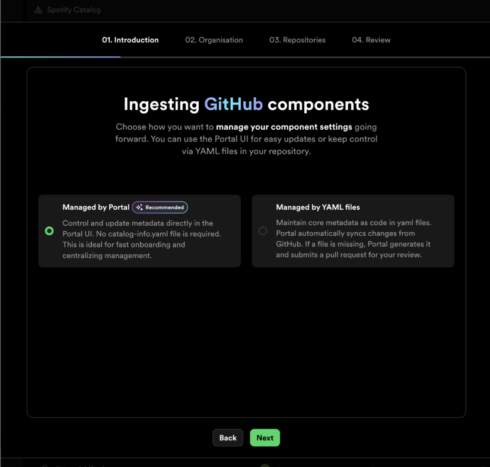

Spotify today announced that Spotify Portal for Backstage is now generally available, providing developers with a ready-to-use version of Backstage, its open source solution for building internal developer portals (IDPs).
“Built on a decade of experience improving developer experience at scale, Spotify Portal combines developer velocity, operational insight, and AI-powered assistance into a single pane of glass. It’s the proven foundation for organizations that want to harness AI and platform engineering together to transform developer experience into a measurable business advantage,” Spotify wrote in an announcement.
As part of this general availability release, the company added several new features to help further improve developer experience. It now includes access to Confidence, which is Spotify’s internal product experimentation platform that allows development teams to design, run, and analyze experiments within Spotify Portal so that they can validate ideas faster.
Another new feature is the Catalog Wizard for the Backstage catalog, a directory of all websites, APIs, and services in a developer platform. The new wizard will enable teams to more easily keep the catalogue up-to-date, and allows users to create and update entries directly in the UI.
The company also added a new plugin installer and studio. Promoted Plugins allow users to install validated plugins directly into their Portal instance, while the Portal Studio allows users to build integration into their Portal instance.
Spotify Portal now includes a new template editor as well for building and customizing scaffolder templates from a library of UI components and reusable actions.
In addition, Spotify integrated Soundcheck, which is the scorecard it uses internally for measuring engineering quality.
And finally, AiKA, which is an AI assistant for Portal, can now connect to third-party MCP servers and trigger actions in Portal. AiKA itself also functions as an MCP server, allowing developers to connect it up to tools like Cursor or Copilot and access Portal data.
“The general availability of Spotify Portal marks a pivotal moment in how organizations build, measure, and optimize developer experience. What began as an internal tool for Spotify engineers is now a fully-fledged platform for enterprises, combining the reliability of Backstage, the insight of Confidence, and the speed of AI-driven workflows,” Spotify wrote.




